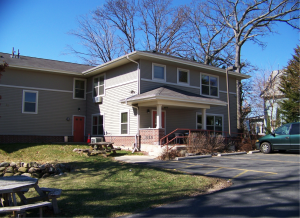Housing first in Madison
by Gretchen Christensen
When a person has been homeless for a long time, there are a surprising number of adjustments that they need to make once they get a permanent home again, said Dean Loumos of Housing Initiatives.
While people who haven’t experienced homelessness might assume that a person would move in and set up a home immediately, relieved to sleep in a real bed and have the opportunity to spread out and make a place their own, Loumos said this isn’t always the case. In fact, it sometimes takes people months to move into the bedroom and stop sleeping by the door, he said.
“People (are) always looking to watch their back and ready to run because of what’s happened to them over the years. Living homeless for a long time, outside, it’s not easy and it’s not safe and things can happen,” Loumos said.
Loumos is the executive director of Housing Initiatives, and has been with the company for almost all of its twenty years. He oversees the entire program, including the company’s properties and staff.

The Ruskin House, one of Housing Initiatives’ properties, has won both local and national awards for providing housing first to individuals who are homeless and mentally ill in Madison. (Housing Initiatives)
Housing Initiatives is the only Madison-based nonprofit that provides permanent housing specifically for people in Madison who are mentally ill and chronically homeless. A chronically homeless person is someone who has been homeless for a number of years, and who uses a disproportionate amount of services for the homeless.
Many chronically homeless people are also mentally ill. Amanda White, a consultant with Housing Initiatives, said that one third – almost 950 – of Madison’s homeless people have a diagnosed mental illness, and another third are thought to have an undiagnosed mental illness.
“It really is a huge leading factor to homelessness,” White said.
Housing Initiatives uses an approach called Housing First, which is based on the idea that people should be given housing as a foundation from which to solve other issues instead of the other way around, as it is difficult to deal with issues such as mental illness and addiction without having a reliable place to stay.
There are three essential components of Housing First, which has existed for about 20 years and is also practiced by Porchlight, the YWCA and The Road Home.
The first is to have outreach people who are able to develop relationships with people who are sometimes resistant to help, Loumos said.
The outreach workers then bring them back to a housing program, which helps them find housing without imposing any prerequisites. The idea is to give them permanent housing to facilitate treatment of mental illnesses or addictions, rather than requiring them to work through other issues before being provided housing.
The second component is to have available units. This may seem obvious and easy, but it is difficult in Madison, which has uncommonly low vacancy rates and insufficient low-income housing.
To combat this problem, Housing Initiatives recently began seeking the funding to develop 30 more units, and has been working with the county housing development program to develop 20 additional units.
The third component of the Housing First system is to help the person set up and maintain their new home by connecting them with case managers who can help them find employment and healthcare providers, and who can help them with day-to-day issues like managing finances.
Many of the properties are in neighborhoods, which Loumos said the clients prefer.
“People want (neighborhoods) instead of large supportive housing programs – which are wonderful, and the ones we have work really well. But people prefer to live in a community like they remember, and what we find is that many of them assimilate into the neighborhood, and function at a high level,” he said.
When Housing Initiatives first began over 20 years ago, they had one employee – Loumos – and one duplex. They recently hired their seventh employee, and they have 114 units in 27 different properties.
They are adding new tenants all the time, which Loumos said is the best part of his job.
Housing Initiatives recently placed into housing three people who were camping under bridges after having been banned from sleeping in front of the city-county building. “It’s always cool when you get to put someone in a house. One was a Vietnam veteran, 65 years-old,” Loumos said.
Housing Initiatives has two main goals for the future.
The first is to end homelessness for veterans. Loumos said there is a national initiative to do so, and both his program and others here in Madison want to help that initiative succeed. Housing Initiatives currently houses 50 veterans, and Loumos hopes to house another 20 more by the end of 2016.
“There’s something wrong that we even have homelessness in this country, but there’s something even more wrong about being homeless and a veteran. That commitment they made has to be returned,” Loumos said.
He also hopes to increase their number of available units. Due to Madison’s low vacancy rates, Loumos said the best way to go about providing permanent housing for the chronically homeless is to build more affordable housing. While Housing Initiatives is raising their own funds to build properties, Loumos hopes an increase in government subsidies will also encourage developers to create more affordable units.
“Communities and policy-makers at high levels are just going to have to understand that the government has to develop affordable housing. Without proper funding, we’re just going to be spinning our wheels. There has to be advocacy at the policy-maker level while we do our work,” he said.
 The Arc: Visions of justice
The Arc: Visions of justice